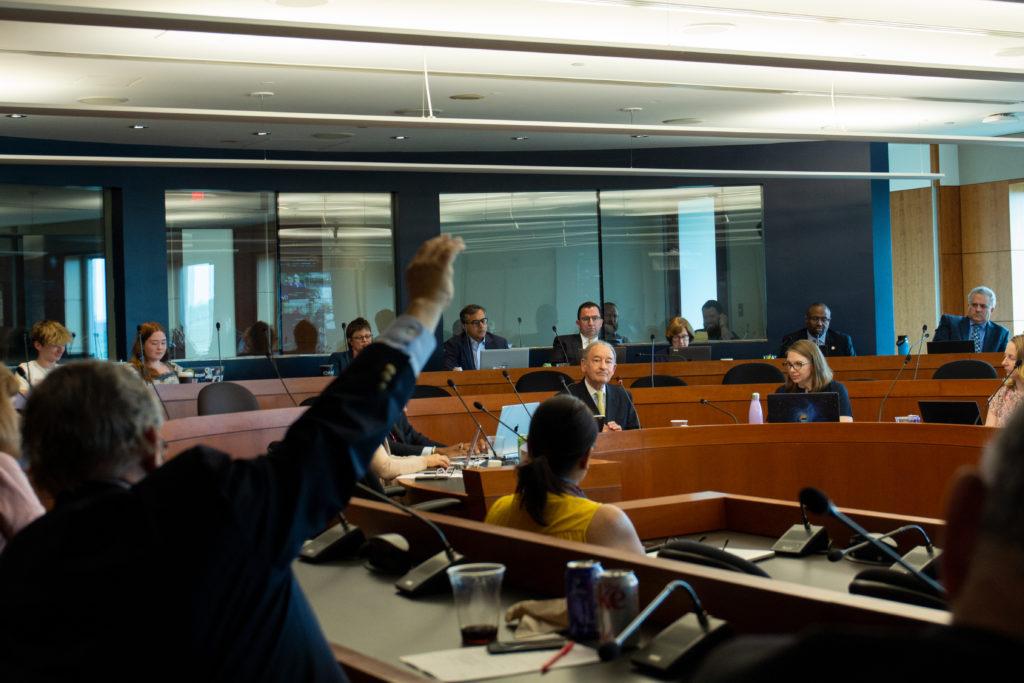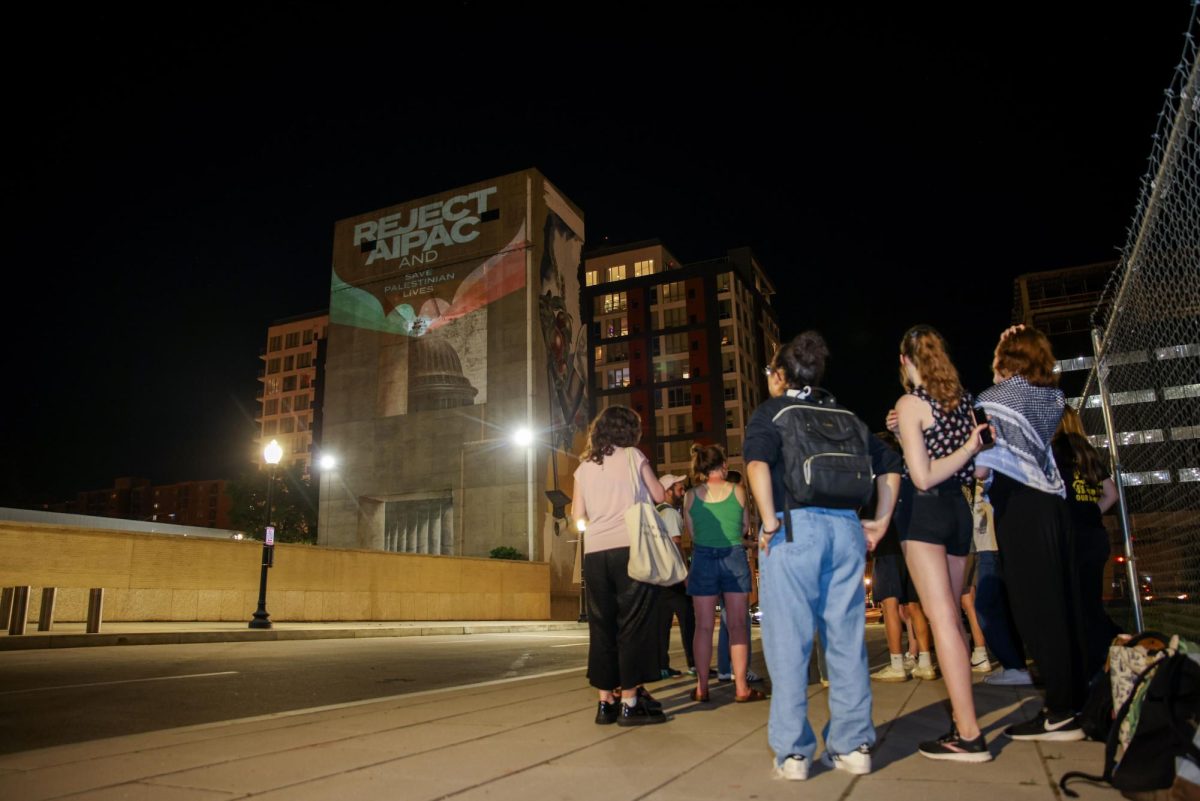Updated: April 18, 2023, at 12:57 p.m.
Faculty senators responded to the Board of Trustees’ decision to arm GW Police Department officers during the Faculty Senate meeting Friday, a move some senators called “tone-deaf” and a detriment to shared governance principles.
Provost Chris Bracey said the Board started considering whether to arm GWPD officers in June 2022 and made the final decision during the February board meeting in response to widespread gun violence across the United States and on college campuses, like the shooting at Michigan State University earlier that month. Senators said the Board’s decision to arm roughly 20 GWPD officers with 9 mm handguns by the fall “reflects poorly” on GW’s commitment to shared governance because trustees only notified the senate’s Executive Committee in February that they were discussing the issue before briefing the committee Tuesday about their final decision.
“It was February when the Board was meeting, a significant period of time had passed, there are incidents at other colleges and universities,” Bracey said in an interview following the Friday senate meeting. “I imagined the Board wanted to make a decision.”
Sarah Wagner, a faculty senator and professor of anthropology, said the Board’s direction to arm GWPD officers appears to be a “top-down decision” made by the administration without consulting faculty and students. Interim University President Mark Wrighton said in his email announcing the Board’s decision to the GW community Monday that the University is working with 21CP Solutions, Inc., a law enforcement consulting firm, “to help guide its planning” to arm officers.
“There is also an in-house firm that is the faculty and students,” Wagner said at the meeting. “I just question the extent to which we were consulted in this process, a decision that’s been made as we hear and that’s been emailed to us. And now we’re talking about the implementation. We are not talking about the decision itself.”
Wagner said she is “alarmed” by the Board’s decision because it increases the number of weapons on campus. D.C. has 547 police officers per 100,000 people, the highest rate of police per capita of any U.S. city with a population over 250,000, according to WUSA9.
Wagner said officials could make other decisions to increase the GW community’s safety, like investing in the University’s mental health care services.
Officials said they were looking to increase the number of counselors in Counseling and Psychological Services from 12 to 18 in fall 2021 following an influx of student appointments, which officials attributed to the effects of returning to campus during the COVID-19 pandemic. CAPS currently employs 10 staff clinicians and one staff psychologist, according to the CAPS website.
“We are making a choice to arm our police officers on campus, and I understand there’s a dearth of mental health professionals to be able to fill this,” Wagner said. “But that’s a choice about safety. How could we prioritize that better to protect our community in a different way?”
GWPD Chief James Tate said in an interview that GWPD officers now refer mental health-related dispatches to EMeRG and wait on standby for EMeRG responders to notify them whether officers need to enter a scene instead of intervening directly, which can be “overwhelming” for the subject.
Tate said the armed officers will receive training from Metropolitan Police Department officers on use of force, de-escalation and firearm usage. The University will appoint a review board that will oversee armed officers, and students will be able to provide feedback on the decision via the GWPD website.
Philip Wirtz, a faculty senator, said he was “sworn to secrecy” after he learned of the Board’s decision to arm GWPD officers at a senate Executive Committee meeting Tuesday, two months after trustees made the decision. He said this decision has not been the only instance in which officials did not consider faculty opinions before making a move affecting the entire University.
The senate approved shared governance principles that aim to increase collaboration and give faculty a “key decision-making” role in the University last April. The Board approved the shared governance principles in May 2022, which sealed about a yearlong effort to repair relations between faculty, administrators and trustees after a period of tense divisions leading up to the end of former University President Thomas LeBlanc’s administration.
“I am taking away from the Board the responsibility that they are able to make these decisions without bothering to consult anyone,” Wirtz said. “Or if they do consulting, they consult them and say ‘By the way, this is off the record, we don’t want you talking about this to the colleagues.’”
Wrighton said during the senate meeting he considered moving all meetings with faculty that include discussions over an “important topic” – like the University’s choice to arm officers – to executive sessions, which are not open to the public. He said he did not do so because it would require a supermajority of faculty senators to approve the measure, and he did not want to risk “losing” if he recommended it.
“It’s very difficult to make decisions and to have discussions when you have members of the media taking your photographs,” Wrighton said.
Wrighton said at the senate meeting that GWPD’s knowledge of University buildings better equips them to respond to emergency situations on campus. He said GW has taken steps to enhance safety over the last three years through “extensive” officer training and the installation of both more GWorld card readers at buildings’ entrances and emergency lockdown buttons in classrooms.
“We need to be prepared in today’s world to respond effectively,” Wrighton said.
Wrighton said policing at the University is “very different” from other kinds of policing because of the potential for “conflict” among students, faculty and staff members. He said officials need to invest more in its mental health services and train GWPD officers to collaborate with social workers when responding to people experiencing a mental health “crisis.”
“As many of the faculty will appreciate, we have really outstanding students, but not all people are perfect,” Wrighton said. “And sometimes we need to deal with conflict among students and with members of the staff and with even professors.”
Angela Gore, a faculty senator and a professor of accountancy, said she would feel safer on campus knowing certain officers were specially trained and equipped with firearms because she said she experienced an active shooter situation earlier in her life.
“I do agree with this decision, and this is coming from somebody who dislikes guns so intensely that I’m viscerally afraid of them,” Gore said.
Murli Gupta, a faculty senator and professor of mathematics, said there is a lack of mandated training from the University about how to prepare for a possible active shooter situation on campus.
Groups of more than five people can request a “discussion-board” active shooter training from the Division of Safety and Facilities, but the training is not required and does not feature any hands-on training exercises like demonstrations or simulations.
“I have been here almost 45 years, and I don’t believe we’ve ever had a drill or a seminar where we were required to learn what to do,” Gupta said.
Grace Chinowsky, Rachel Moon, Nick Pasion and Fiona Riley contributed reporting.











